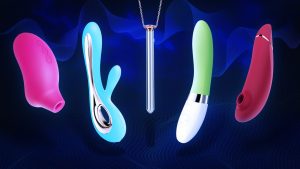In general, vibrators themselves are not physically addictive. They are sexual aids designed to enhance pleasure and can be used as a tool for self-exploration, self-care, and sexual satisfaction. Most people can use vibrators without developing an addiction.
However, it’s important to be aware that individuals can develop psychological or behavioral patterns of reliance or dependency on certain activities or behaviors, including vibrator use. This can be more related to the psychological and emotional aspects of sexuality rather than a physical addiction.
If you find that your vibrator use is interfering with your daily life, relationships, or overall well-being, or if you feel a compulsive need to rely on a vibrator for sexual satisfaction, it may be beneficial to seek support from a healthcare professional or a therapist specializing in sexual health. They can help assess your situation, provide guidance, and address any concerns or patterns that may be causing distress.
Remember, it’s important to maintain a healthy balance and prioritize your overall well-being in all aspects of your life, including your sexual experiences.
Needing a vibrator to orgasm is normal ?
Needing a vibrator to achieve orgasm is a common experience for many individuals and can be completely normal. Each person’s body and sexual response are unique, and what works for one person may not work for another.
Vibrators provide intense and targeted stimulation that can be highly effective in achieving orgasm for those who may have difficulty reaching climax through other means. They can enhance sexual pleasure, explore different sensations, and assist in discovering what feels pleasurable for an individual.
It’s important to remember that there is no “normal” or “right” way to experience pleasure or reach orgasm. What matters most is finding what works for you and brings you satisfaction and pleasure. If using a vibrator helps you achieve orgasm and enhances your sexual experiences, there is no reason to feel concerned or ashamed.
However, if you have concerns about relying solely on a vibrator for orgasm or if it causes distress or interferes with your ability to experience pleasure in other ways, it may be helpful to explore different techniques or seek guidance from a healthcare professional or a therapist specializing in sexual health. They can provide support, suggestions, and help you develop a more varied and fulfilling sexual repertoire.
Will using a vibrator frequently desensitize your clit?
Frequent vibrator use does not necessarily lead to permanent desensitization of the clitoris. However, there is a possibility of temporary desensitization if the vibrator is used with excessive intensity or for prolonged periods of time.
The clitoris, like any other part of the body, can experience temporary sensitivity changes with repeated or intense stimulation. This is known as temporary desensitization or sensory adaptation. It usually resolves on its own within a short period of time, allowing sensitivity to return to normal.
To minimize the risk of temporary desensitization, you can consider the following:
- Use appropriate intensity: Be mindful of the intensity level of your vibrator and avoid using excessively high settings that may overstimulate the clitoris. Start with lower settings and gradually increase if desired.
- Vary stimulation techniques: Explore different types of touch and vibration patterns to avoid continuous and repetitive stimulation in the same spot. This can help prevent overstimulation and potential desensitization.
- Take breaks: Allow your body time to rest and recover between vibrator sessions. Taking regular breaks can help maintain sensitivity and prevent potential desensitization.
- Engage in diverse stimulation: Incorporate other forms of stimulation, such as manual touch or partner play, to provide variety and prevent overreliance on a single method.
If you notice any temporary changes in clitoral sensitivity, taking a break from vibrator use for a few days or using gentler forms of stimulation can help restore sensitivity. If you have concerns or experience persistent changes in sensitivity, it’s always a good idea to consult with a healthcare professional who can provide personalized advice and guidance.

Tips on how not to get addicted to vibrators
Using vibrators responsibly and maintaining a healthy relationship https://incognito.black with them is important to avoid potential dependency or unhealthy patterns. Here are some tips to help you use vibrators in a balanced and mindful way:
- Variety is key: Don’t limit yourself to using a vibrator as your sole source of sexual pleasure. Incorporate other forms of stimulation, such as manual stimulation or partner play, to maintain a diverse and satisfying sexual experience.
- Set boundaries: Establish clear boundaries for your vibrator use. Determine how often and for how long you will use it. Setting limits can help prevent overreliance and maintain a balanced approach to your sexual pleasure.
- Explore different sensations: Experiment with different types of touch, techniques, and erogenous zones. This can help you discover new sources of pleasure and reduce dependence on a single method of stimulation.
- Mindful self-awareness: Stay attuned to your body’s responses and desires. Pay attention to what feels pleasurable and satisfying, and be open to exploring different sensations and experiences.
- Maintain intimacy with your partner: If you’re in a relationship, ensure that you maintain a healthy and satisfying sexual connection with your partner. Communicate your needs, desires, and boundaries, and engage in shared sexual experiences to foster emotional and physical intimacy.
- Take breaks: It can be helpful to take periodic breaks from vibrator use to allow yourself to explore and experience pleasure without relying on it. This can help prevent any potential psychological reliance.
- Seek support if needed: If you feel that your vibrator use is becoming compulsive or interfering with your daily life, self-esteem, or relationships, consider reaching out to a healthcare professional or a therapist specializing in sexual health. They can provide guidance, support, and strategies to help you develop a healthier relationship with your sexuality.
Remember, the key is to use vibrators in a way that enhances your sexual experiences and pleasure without causing negative impacts on your overall well-being or relationships. Everyone’s preferences and needs are different, so find a balance that works for you.
Why are people so afraid of vibrator addiction?
The fear or concern about vibrator addiction may stem from various factors, including societal stigma, misinformation, or personal beliefs about sexuality. Here are some reasons why people might express concerns about vibrator addiction:
- Lack of education: Many people may not have accurate information about sexuality, including the use of sex toys. This can lead to misconceptions and unfounded fears about the potential for addiction.
- Cultural and societal attitudes: Society often carries taboos and stigmas around topics related to sex and pleasure. This can contribute to a general discomfort or fear surrounding the use of sex toys, including vibrators.
- Fear of dependency: Some individuals worry that relying on a vibrator for sexual pleasure may create a dependency or hinder their ability to enjoy other forms of stimulation. This concern may stem from the belief that one should be able to experience pleasure without external aids.
- Personal beliefs and values: Individuals may hold personal or religious beliefs that discourage or condemn the use of sex toys. These beliefs can contribute to fears and concerns about addiction or moral implications.
It’s important to note that the concept of vibrator addiction is not supported by scientific evidence. Vibrators are tools designed to enhance sexual pleasure and can be used responsibly and in a balanced manner. Like any behavior or activity, it’s crucial to maintain a healthy relationship with sex toys, prioritize consent and communication, and ensure that their use enhances rather than hinders overall well-being and satisfaction.
If you have concerns about your own relationship with sex toys or would like to explore this topic further, it can be helpful to consult with a healthcare professional or a therapist specializing in sexual health. They can provide guidance, address any concerns, and help you develop a healthy and fulfilling sexual repertoire.
